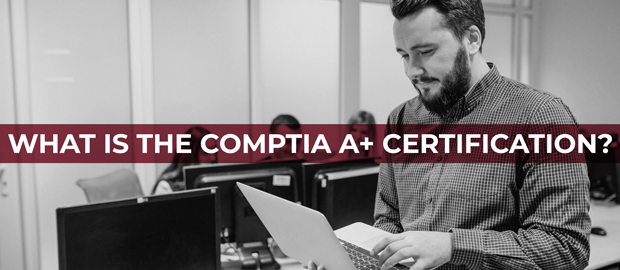Introduction:
The CompTIA A+ certification is a globally recognized credential that validates the foundational skills and knowledge of IT professionals. Whether you’re a seasoned IT professional looking to enhance your skills or a newcomer aspiring to enter the field, achieving the CompTIA A+ certification can open doors to various job opportunities. This article provides a comprehensive guide on how to prepare for the CompTIA A+ certification exam, covering key aspects from understanding the exam objectives to practical tips for success.
Understanding the CompTIA A+ Certification:
The CompTIA A+ certification is designed to validate the essential skills required for entry-level IT roles. It covers a broad range of topics, including hardware, software, networking, security, and troubleshooting. The certification is vendor-neutral, meaning it is not tied to a specific technology or product, making it relevant across different IT environments.
Exam Objectives:
Before diving into preparation, it’s crucial to understand the exam objectives. CompTIA regularly updates the A+ certification to ensure it reflects the current IT landscape. The exam objectives are categorized into two parts: Core 1 (220-1001) and Core 2 (220-1002). Each part covers specific domains, and candidates need to demonstrate proficiency in these areas to pass the exam.
Core 1 (220-1001) Exam Objectives:
Mobile devices
Networking
Hardware
Virtualization and cloud computing
Hardware and network troubleshooting
Core 2 (220-1002) Exam Objectives:
Operating systems
Security
Software troubleshooting
Operational procedures
Create a Study Plan:
Developing a structured study plan is crucial for effective exam preparation. Consider the following steps when creating your study plan:
Assess Your Current Knowledge:
Identify your strengths and weaknesses in each exam objective.
Focus more on areas where you lack proficiency.
Set Realistic Goals:
Break down your study plan into manageable goals.
Establish a timeline for each goal to track your progress.
Use Reliable Study Materials:
Invest in official CompTIA study materials, such as the CompTIA A+ Exam Objectives.
Explore additional resources like textbooks, online courses, and practice exams.
Hands-On Experience:
Build a home lab environment to gain practical experience.
Practice troubleshooting scenarios to enhance your problem-solving skills.
Schedule Regular Study Sessions:
Consistency is key. Allocate dedicated time each day or week for studying.
Avoid cramming, and instead, focus on regular, steady progress.
Recommended Study Resources:
CompTIA A+ Official Study Guide:
The official study guide is a comprehensive resource aligned with the exam objectives.
It includes practice questions and hands-on labs to reinforce learning.
Online Courses:
Platforms like Coursera, Udemy, and Pluralsight offer A+ certification courses.
Choose courses with positive reviews and high-quality content.
Practice Exams:
Use practice exams to familiarize yourself with the exam format and question types.
Identify areas of improvement based on your performance.
Hands-On Labs:
Set up a virtual or physical lab environment to practice configuring and troubleshooting hardware and software.
Practical experience enhances your understanding of real-world scenarios.
Practical Tips for Exam Preparation:
Flashcards:
Create flashcards to reinforce key concepts and acronyms.
Use them for quick reviews during downtime.
Study Groups:
Join online forums or local study groups to discuss topics with fellow candidates.
Teaching others can deepen your understanding of the material.
Stay Updated:
CompTIA regularly updates its exam objectives to align with industry changes.
Stay informed about updates through the official CompTIA website.
Simulations:
Practice performance-based questions and simulations.
These questions assess your ability to perform specific tasks in a simulated IT environment.
Time Management:
Practice time management during your study sessions and practice exams.
Ensure you can complete the exam within the allotted time.
Final Exam Preparation:
As the exam date approaches, focus on fine-tuning your knowledge and addressing any remaining gaps. Consider the following strategies for final exam preparation:
Review Weak Areas:
Spend extra time reviewing areas where you feel less confident.
Use targeted resources to reinforce these concepts.
Mock Exams:
Take full-length mock exams under simulated exam conditions.
Analyze your performance and identify areas for improvement.
Exam Objectives Checklist:
Create a checklist of exam objectives and mark them off as you review.
Ensure you’ve covered all the necessary topics.
Relaxation Techniques:
Practice relaxation techniques to manage exam-day stress.
Ensure you get a good night’s sleep before the exam.
Exam-Day Logistics:
Familiarize yourself with the exam center location and logistics.
Arrive early on exam day to minimize stress.
Focus on Practical Skills:
Recognizing the importance of practical skills in real-world scenarios, CompTIA has placed an increased emphasis on hands-on experience in the A+ certification. The certification now incorporates performance-based questions and simulations, allowing candidates to demonstrate their ability to apply knowledge in practical situations. This shift aligns with industry trends that prioritize practical skills over theoretical knowledge, making A+ certified professionals more adept at tackling on-the-job challenges.
Cybersecurity Integration:
As cybersecurity threats continue to evolve, IT professionals need to be well-versed in security best practices. CompTIA has responded to this demand by integrating cybersecurity concepts into the A+ certification. Candidates now need to demonstrate a solid understanding of cybersecurity fundamentals, including threat detection, secure network configurations, and data protection. This addition not only enhances the certification’s value but also equips individuals with essential skills to safeguard digital assets.
Expanded Coverage of Mobile Devices:
With the proliferation of mobile devices in both personal and professional settings, the A+ certification has expanded its coverage to include a more comprehensive understanding of mobile technologies. This includes troubleshooting mobile devices, configuring mobile operating systems, and addressing common issues associated with smartphones and tablets. This expansion ensures that A+ certified professionals are well-equipped to handle the diverse array of devices prevalent in today’s tech-driven world.
Remote Support and Virtualization:
The modern IT landscape often involves supporting users and systems remotely. Recognizing this trend, CompTIA’s A+ certification now includes content related to remote support technologies. Candidates are required to demonstrate proficiency in remote access methods, troubleshooting remote connectivity issues, and providing effective remote assistance. Additionally, the certification addresses the growing importance of virtualization technologies, ensuring that professionals are adept at managing virtualized environments.
Soft Skills and Customer Service:
Beyond technical expertise, IT professionals are increasingly required to possess strong communication and customer service skills. CompTIA has acknowledged this shift by incorporating soft skills into the A+ certification. Candidates are evaluated on their ability to communicate effectively with clients, understand their needs, and provide solutions in a customer-friendly manner. This holistic approach reflects the industry’s recognition of the IT professional as not only a technical expert but also a customer-focused problem solver.
Conclusion:
Achieving the CompTIA A+ certification requires a combination of thorough preparation, hands-on experience, and a strategic approach to studying. By understanding the exam objectives, creating a structured study plan, and utilizing reliable study resources, you can enhance your chances of success. Remember that the journey to certification is as valuable as the certification itself, as it equips you with the skills needed for a successful career in IT. Best of luck on your journey to becoming CompTIA A+ certified!













